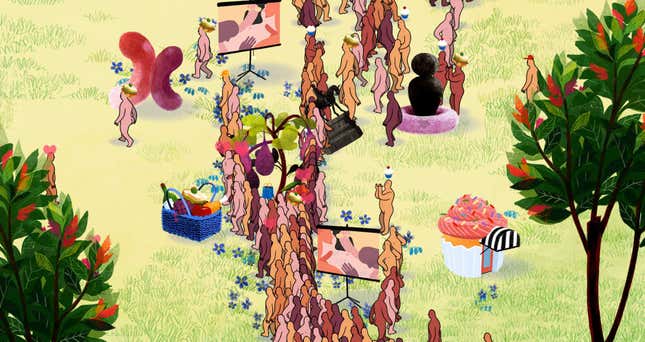
We Dwell in Possibility is a garden simulator by Robert Yang, a New Zealand developer who’s known for his queer sex games, and renowned graphic artist Eleanor Davis. The collaboration makes a notable shift from Yang’s previous work but maintains a similar vision.
The game is incredibly simple: you’re given a garden, and characters will bring items to your garden. You can move the item around, plant it, remove it, or leave it as-is. In fact, you can sit as a spectator for the whole game and merely watch as it plays out. But, as I quickly learned, these objects are not merely for decoration. The items also attract and influence new peeps as well. A radio will start a dance session, while a police helmet will turn them into cops.
The peeps will sometimes ponder a buttplug obelisk as if it were a Monet in a museum. They’re all naked, and the game has no regard for whether or not these characters have (or don’t have) breasts, penises, or vaginas. Characters can change these aspects at will. There are also different skin tones and “thick” and “thin” body sizes, as creator Robert Yang describes them in a blog post that explains the inspirations behind the game. And when these NPCs dance and make out and eat sandwiches, it feels like a celebration of life. And that’s what makes We Dwell in Possibility feel special.
But then I went and ruined it.
I put up a statue, not realizing it was a Churchill statue. I just wanted art! But my actions inadvertently started to yuck everyone’s yum. The fun tunes from the radio started sounding like discordant strings, and eventually the peeps ran off with my butt plugs, plants, and radios. You can stop them, but as the horde of peeps grew larger, it became harder to control them. By the time night fell in the game, the only thing left was me trying to decide if I was happy with my creation or not.
We Dwell in Possibility is as much an art piece as it is a game. Yang writes that he wanted to create an accessible queer game, rather than making another sex game that requires a PC. We Dwell in Possibility is mobile-friendly, and since it’s browser-based, Yang doesn’t have to bend to the somewhat conservative will of Apple’s App Store or the Google Play Store.
The focus on accessibility led Yang to Davis, who can make 2D art better suited for mobile players. Her art in We Dwell in Possibility is exquisite and it carries much of the game’s charm. By Yang’s own admission, he’s known for “uncanny CG beefcake sex games.” Those are delightful in their own right. Still, Davis’s vision offers players something magical.
In the real world, it’s not so easy to make genital changes, nor is it as easy to prevent Tory influence by taking down a statue. And yet, art imitates life a little too well. The cops and Tories of We Dwell in Paradise come packed with insincere rainbow flags of their own. Playing the game, it’s hard not to think of Pride and the pushback against its commercialization and police presence.
The game is a painful reminder of how easily beauty is lost. It’s also silly. Did I do enough to protect my Peeps from kissing by the buttplug? I feel like I didn’t. Still, that doesn’t mean we can’t keep trying. Maybe on my next playthrough I’ll find my queer utopia.